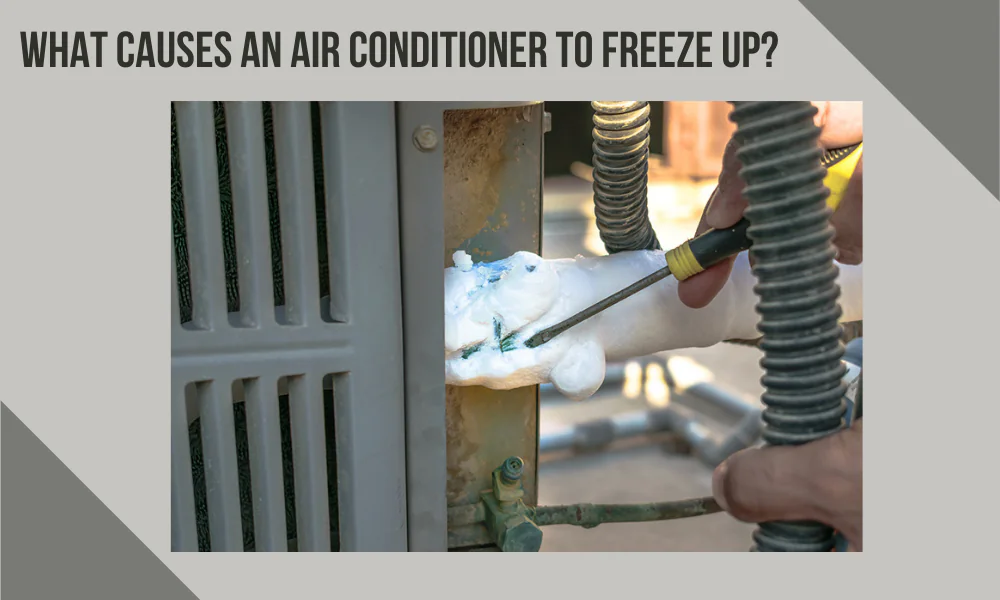What causes AC to freeze up? It’s strange to see your air conditioner coil or refrigerant pipes covered in ice, especially if it happens on a hot summer day. Even though you can’t see the ice, you’ll know if your air conditioner is freezing up. Place your hand over a supply register and if you don’t feel much airflow, you may have a frozen air conditioner.
Despite the ironic happening of an AC freeze in the summertime, air conditioners freezing up is something that happens a lot. Many homeowners lack the knowledge and understanding of air conditioners’ needs to prevent this issue on their own. It’s a problem that can turn a pleasant summer day into a scorching one in a matter of minutes.

How can you tell if you might be facing a freezing problem?
Checking the supply registers is a sure sign. Is it hot? If so, that’s a good indicator of frozen evaporator coils. Check for ice by opening the panel. Keep in mind that the absence of ice does not necessarily imply the absence of a freezing problem. Seeing ice, on the other hand, is almost always a sign that your air conditioner is frozen.
Understanding the Joule-Thomson effect:
Let’s take a look at how your air conditioner works before we get into the causes of it freezing up. To begin, we must recognize that temperature is a measure of a molecule’s energy. Because the molecules in the air have a lot of energy and are moving around quickly, the air feels warm. Cold air, on the other hand, is made mostly of low-energy molecules.
As a result of the Joule-Thomson Effect in thermodynamics, when the air in our air conditioners isn’t compressed, its temperature drops as it expands and the molecules slow down. The molecules become energized and heat up when compressed.
The purpose of an air conditioner is to cool down the refrigerant inside the evaporator coil so that when it exits the air conditioner, it cools the air inside your home and effectively removes the hot air. However, if any part of the air conditioner breaks down, the whole system breaks down.
This causes the refrigerant to cool too quickly in the evaporator coil, causing it to drop below freezing and freeze over.
So, how do you avoid things going wrong in the cooling equation? An AC freeze can be caused by one of three factors. You can stay ahead of the game by recognizing these causes and never have to deal with an AC freeze again. We’ve also provided instructions for fixing each cause, so if you do have an AC problem, you’ll be able to solve it in no time.
Blocked airflow causes freezing up:
Air conditioners require a steady flow of air to prevent humidity from condensing on the coils and freezing. Make sure your air filters aren’t dusty or clogged to keep the airflow in your home moving enough to avoid disrupting your air conditioner’s functioning. The air movement in your home will be restricted as a result of this. Air filters are inexpensive, and it’s recommended to replace them regularly. It’s also a good idea to keep your air conditioner clean and tuned up to avoid airflow issues and other issues in general. Furthermore, according to the US Department of Energy, changing your HVAC filter can increase the efficiency of your HVAC system by 5% to 15%.
How to fix it:
Your air conditioner is already broken, and you noticed clogged air filters. It’s likely a blocked airflow problem. The first step is to turn off the air conditioner and allow it to defrost. Turn on simply the fan for around an hour once it has had enough time to defrost (1-3 hours). This is a good time to replace your air filter.
Mechanical problems or refrigerant leaks?
Moving parts in air conditioners can get jammed, broken, or clogged. It’s possible for refrigerant lines to kink, fans to cease spinning, filters to clog, and things to leak. Any of these factors result in a loss in pressure, allowing the refrigerant to expand excessively and become too cold. Refrigerant is also required to maintain a consistent temperature throughout your machine.
Freezing is also known to occur when the refrigerant level is too low. Some of these issues are easier and less expensive to resolve than others. In the instance of a coolant leak, any repair will most likely only be temporary. It may be time to consider investing in a new machine.
How to fix it:
A short guide to AC freezing does not include mechanical issues or leak remedies. It’s better to deal with these issues with the assistance of a knowledgeable specialist who is familiar with refrigerants. Though refrigerants are safe to use in the house, they should be handled by a professional who understands how to confine them. Whenever you find any mechanical fault or leak, you must call the professional and never try to fix the problem yourself.
Cool summer nights can cause your AC to freeze:
ACs are programmed to function within a set of ideal temperature ranges. When it gets cold in summer night than the optimum temperature, it can damage your Air Conditioner.
How to fix it:
If you have a programmable thermostat, you can get ahead of the problem by turning off the air conditioning when the temperature drops below 60 degrees. If you don’t have a programmable thermometer, keep an eye on the existing temperature each night and anticipate if it’s going to be colder than 60 degrees.
Bottom Line
A freezing air conditioner is a common and irritating problem for all. However, with regular maintenance and tune-ups, the problems that cause a frozen air conditioner can be avoided. Regular tune-ups and air filter changes go a long way toward reducing mechanical problems, clogging, and leaks. Never try to fix the problem yourself and always call a professional whenever you find something wrong with the AC unit.

0 Comments